In the evolving world of skincare, one ingredient has managed to consistently remain at the forefront of both clinical studies and dermatological recommendations: retinol. Known for its multifaceted skin-enhancing properties, retinol has become a cornerstone of anti-aging skincare routines, especially when formulated in serums. A retinol face serum delivers this potent ingredient directly to the skin in a highly concentrated, fast-absorbing medium that offers both short-term revitalization and long-term dermal transformation. Understanding how a retinol facial serum works, how to use it safely, and what dermatologists actually recommend can make all the difference between radiant results and unexpected irritation.
You may also like: How to Choose Skin Care for Fine Lines: Evidence-Based Tips for Healthier, Younger-Looking Skin
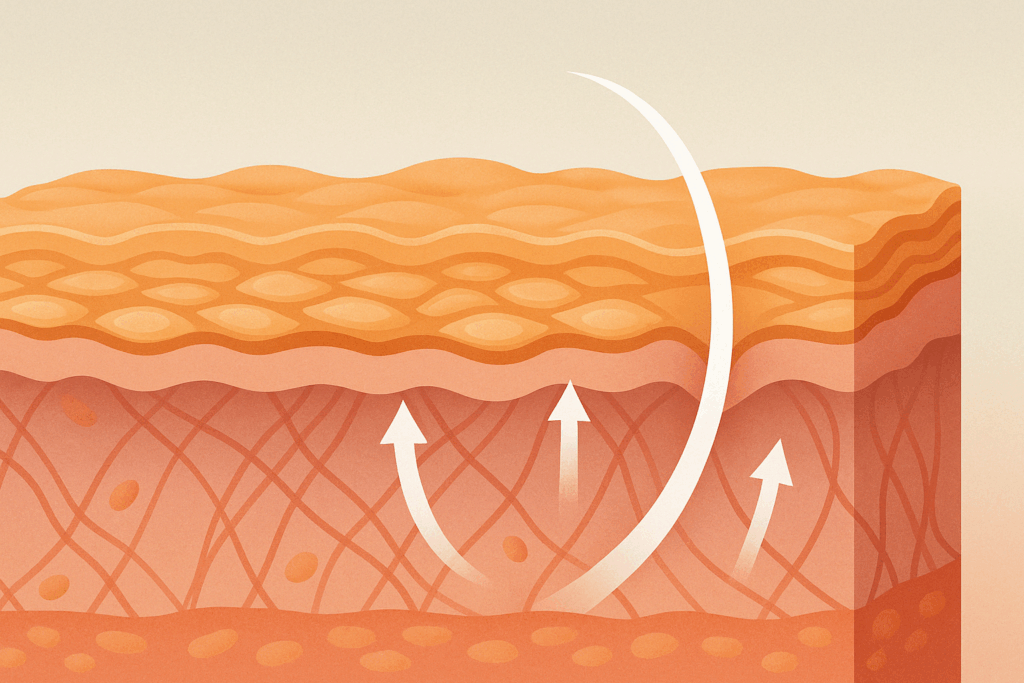
The Science Behind Retinol: How It Works on the Skin
Retinol, a derivative of vitamin A, works by accelerating the rate of cell turnover, which means it helps your skin shed old, damaged cells more quickly while stimulating the production of new, healthier cells underneath. On a microscopic level, this activity helps smooth the texture of the skin, reduce fine lines, unclog pores, and encourage collagen synthesis. Collagen, the structural protein responsible for skin’s elasticity and firmness, naturally declines with age, leading to wrinkles and sagging. Retinol counteracts this process by promoting fibroblast activity—the very cells responsible for collagen production.
What makes retinol particularly effective in serum form is the delivery system. A retinol face serum is generally water- or oil-based with fewer occlusive agents than creams, allowing for deeper penetration of the active ingredient. This facilitates faster results and better efficacy, especially when used consistently over several weeks. It’s no surprise, then, that dermatologists frequently recommend a retinol facial serum as part of a proactive anti-aging regimen.
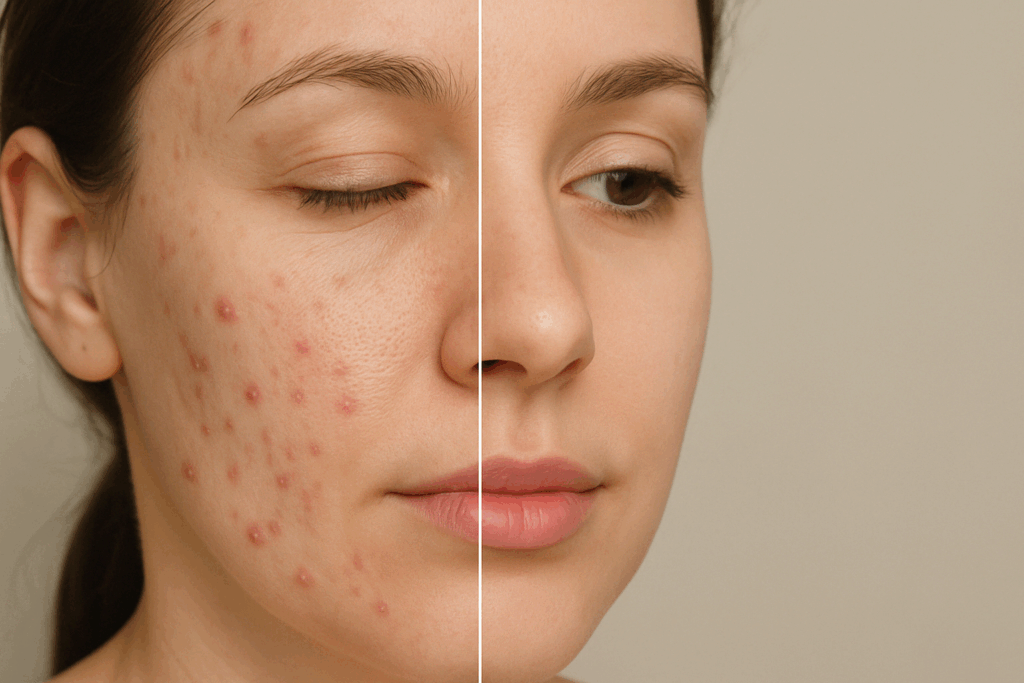
Dermatologist-Recommended Uses: Targeting Aging, Acne, and Texture
While many consumers seek out retinol primarily for its anti-aging benefits, dermatologists emphasize its versatility. A high-quality retinol anti wrinkle serum can also reduce hyperpigmentation, fade acne scars, and treat active acne lesions. By normalizing keratinocyte behavior (the cells that form the outermost layer of the skin), retinol helps keep pores from becoming clogged—one of the primary causes of breakouts.
Furthermore, uneven skin texture and tone, often resulting from prolonged sun exposure or environmental stressors, can significantly improve with regular application of a retinol facial serum. Dermatologists typically recommend starting with a low concentration—around 0.25% to 0.5%—to assess tolerance. As the skin builds resilience, one can gradually increase the strength or frequency of application under professional supervision.
Importantly, dermatologists caution that retinol increases photosensitivity, making it essential to pair a retinol face serum with daily use of broad-spectrum sunscreen. This precaution not only minimizes the risk of irritation but also ensures that skin benefits are maintained and not counteracted by UV damage.
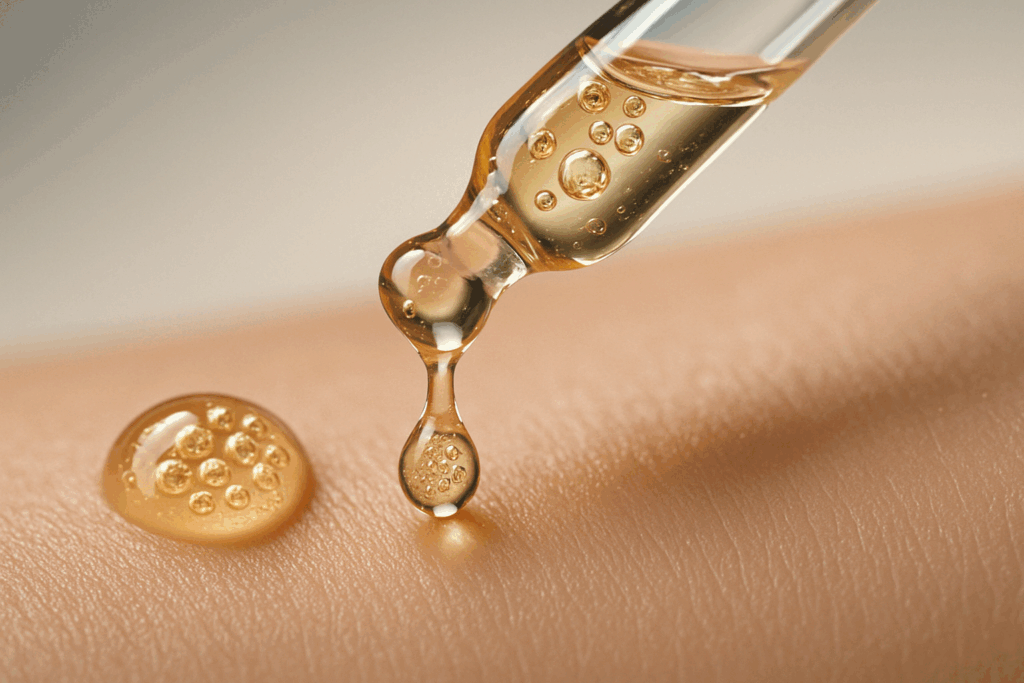
Why Serum Formulations Offer Superior Efficacy
Serums have quickly risen to prominence in skincare because they represent a delivery vehicle engineered for potency. Unlike traditional creams or lotions that may contain a high volume of fillers and emollients, serums are typically composed of active ingredients in their most effective concentrations. In the case of a retinol face serum, this means that users receive a high dose of retinol in a form that penetrates the stratum corneum—the skin’s outermost layer—with remarkable efficiency.
Another benefit of serums is their ability to layer well with other skincare products. A retinol facial serum can easily be incorporated into both morning and evening routines, depending on the concentration and formulation. When used at night, serums allow the skin to repair itself without interference from environmental pollutants or UV rays. This is why dermatologists frequently recommend retinol serums to patients seeking visible improvements in skin tone, elasticity, and clarity within a matter of weeks.
Clinical Evidence: What the Research Says About Retinol’s Effectiveness
Numerous peer-reviewed studies support the effectiveness of retinol in treating signs of aging and acne. One landmark study published in the Journal of Investigative Dermatology found that patients using a retinol cream for 12 weeks saw a measurable improvement in fine lines, collagen density, and epidermal thickness. Other studies have shown that a retinol anti wrinkle serum can reduce the appearance of sunspots and improve skin smoothness in as little as four to six weeks.
Researchers have also explored the synergistic effects of retinol when combined with other actives such as hyaluronic acid, niacinamide, and peptides. These combinations can enhance hydration, reduce inflammation, and counteract some of the irritation commonly associated with retinol use. As a result, many high-quality retinol facial serum products now include such supportive ingredients to create a more well-rounded formula suitable for sensitive or mature skin.
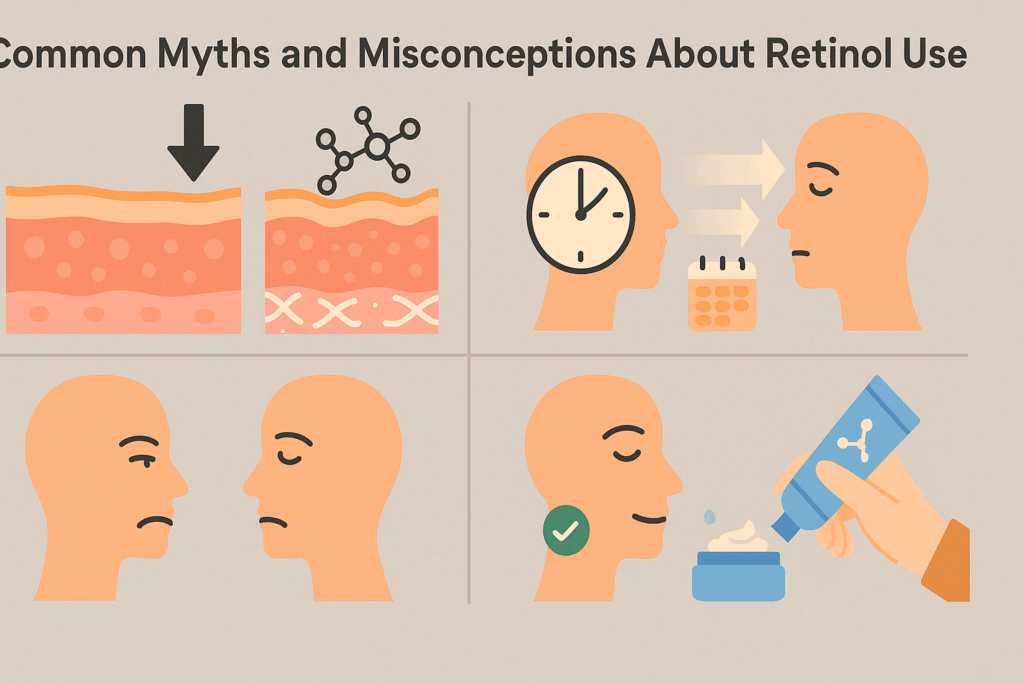
Common Myths and Misconceptions About Retinol Use
Despite its strong scientific backing, misinformation about retinol remains prevalent. One common myth is that retinol should not be used on sensitive skin types. While it’s true that retinol can cause temporary irritation, this can often be mitigated with proper usage and formulation. For example, applying a retinol face serum after a light moisturizer or choosing a time-release formula can significantly reduce the risk of redness and peeling.
Another misconception is that retinol thins the skin. In reality, it does the opposite. By stimulating collagen production and increasing cell turnover, retinol actually thickens the dermis—the layer of skin responsible for structural integrity—while smoothing the outer layer. This results in firmer, plumper skin over time.
It’s also worth addressing the belief that results should be immediate. Retinol’s benefits accrue gradually. Dermatologists often remind patients that it takes consistent use over several weeks to months before substantial improvements become visible. This is especially true for those using a retinol anti wrinkle serum to combat deeper wrinkles or sun damage.
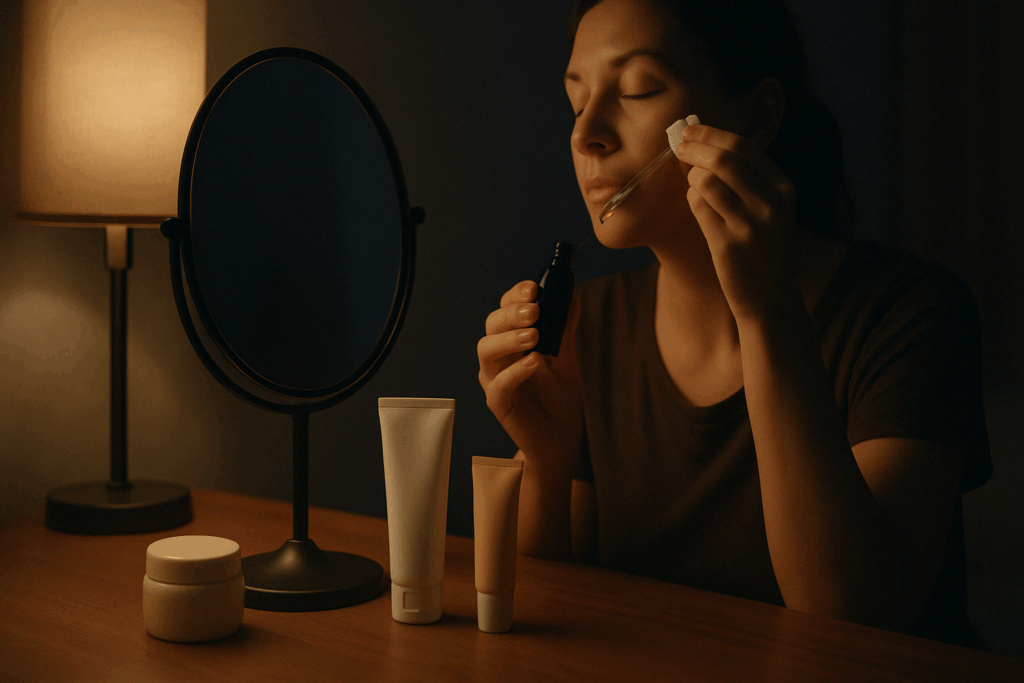
Integrating Retinol Safely Into Your Skincare Routine
Safety is a crucial component of effective retinol use, particularly for first-time users. Dermatologists advise starting with a retinol facial serum just two to three times per week and gradually increasing frequency based on skin tolerance. Doing so allows the skin to adjust without triggering excessive dryness, redness, or sensitivity.
Layering is another technique that enhances both safety and effectiveness. Applying a lightweight moisturizer before and after a retinol face serum can help buffer the ingredient while still allowing it to work effectively. This technique, often referred to as the “sandwich method,” is especially helpful for individuals with dry or reactive skin.
Furthermore, the time of application matters. Retinol is best used in the evening because it breaks down in sunlight, reducing its potency. Nighttime application also takes advantage of the body’s natural repair processes, which are most active during sleep. Finally, always follow up with sunscreen the next morning, as retinol-treated skin is more susceptible to UV damage.
Who Should Use a Retinol Face Serum—And Who Shouldn’t
A retinol facial serum can be a valuable addition to most adult skincare routines, particularly for those concerned with aging, acne, or uneven skin tone. However, it may not be suitable for everyone. Pregnant or breastfeeding individuals are generally advised to avoid retinol, as high doses of vitamin A can be teratogenic.
Individuals with chronic skin conditions such as eczema, rosacea, or psoriasis should consult a dermatologist before beginning retinol treatment. In some cases, lower-strength products or alternative actives like bakuchiol may be recommended. For others, a dermatologist may prescribe a specific regimen that includes a gentle retinol anti wrinkle serum, carefully calibrated to avoid triggering a flare-up.
It’s also important to consider other products being used concurrently. Combining retinol with exfoliating acids like glycolic or salicylic acid without guidance can increase the risk of irritation. Dermatologists often advise phasing such ingredients in and out strategically or alternating their use on different days to maintain skin balance.
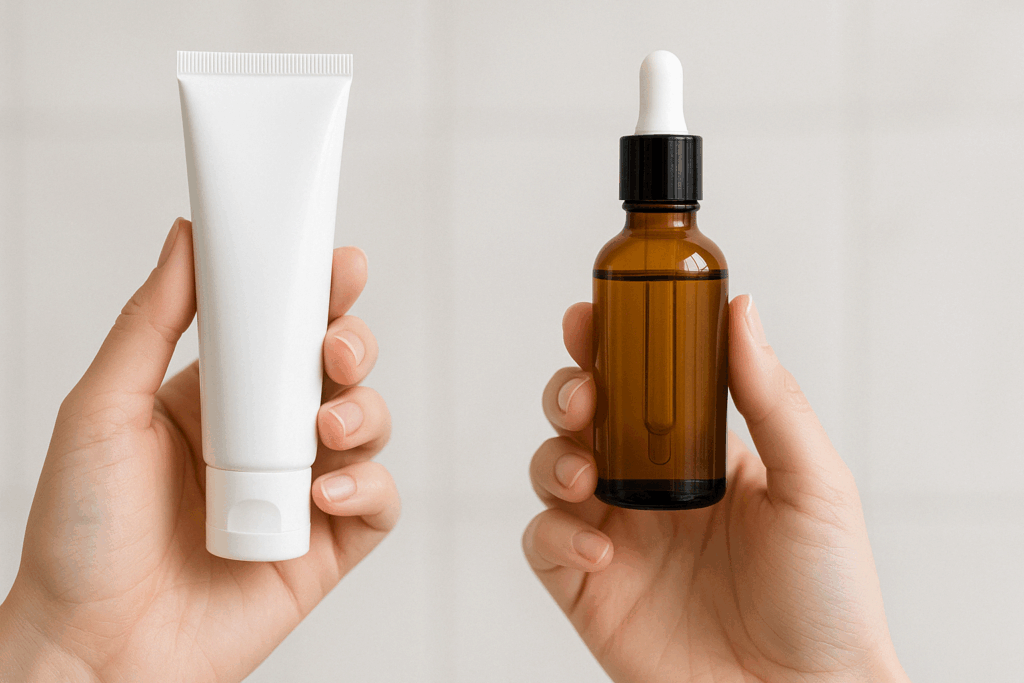
Understanding the Difference Between Over-the-Counter and Prescription Retinoids
Not all retinoids are created equal. Retinol, available in many over-the-counter serums, is a less potent but more tolerable version of retinoic acid, which is found in prescription medications like tretinoin. While a retinol face serum may take longer to yield visible results compared to prescription-strength options, it also carries a lower risk of side effects, making it a better starting point for many users.
Over-the-counter retinol must be converted by the skin into its active form—retinoic acid—before it can exert its effects. Although this conversion step makes the process slower, it also offers a gentler approach that is well-suited for long-term maintenance. Prescription retinoids, by contrast, act more quickly and aggressively, which can be beneficial for certain conditions like cystic acne but may require close supervision.
Dermatologists often recommend beginning with an over-the-counter retinol facial serum to build skin tolerance before moving to stronger options if needed. This graduated approach not only minimizes the risk of adverse reactions but also helps users develop a sustainable routine they’re more likely to adhere to over time.
Formulation Matters: How to Choose the Right Retinol Facial Serum
Not all retinol serums are formulated equally, and choosing the right one can significantly influence your experience and outcomes. The ideal product should balance potency with gentleness, incorporating stabilizing and hydrating ingredients that support skin barrier function. Look for formulations that include hyaluronic acid, ceramides, or panthenol to help offset potential dryness.
Packaging also plays a role in efficacy. Because retinol is sensitive to light and air, it should be housed in opaque, airtight containers that prevent degradation. Droppers, pumps, and tubes that minimize air exposure can prolong shelf life and ensure that the product remains effective throughout its usage.
Dermatologists advise reading labels carefully to identify both the concentration of retinol and the presence of complementary ingredients. A retinol anti wrinkle serum that includes antioxidants like vitamin C or E can further protect the skin from oxidative stress and enhance results. Clinical endorsements and consumer reviews may also offer guidance, but nothing replaces a personalized recommendation from a licensed professional.

Long-Term Benefits: What to Expect with Consistent Use
Consistency is key when it comes to reaping the long-term benefits of retinol. With regular application, users often notice improvements in skin tone, texture, and firmness within a few months. Fine lines become less pronounced, pores appear smaller, and the skin takes on a brighter, more youthful glow. These benefits are not merely cosmetic but also reflect deeper changes within the dermal structure, including increased collagen and elastin production.
Over time, a retinol facial serum can contribute to a more resilient skin barrier, helping it better withstand environmental stressors such as pollution, UV radiation, and dehydration. This resilience becomes increasingly important with age, as the skin’s natural repair processes slow down. A consistent regimen that includes a well-formulated retinol face serum serves not just as a corrective measure but as a preventive one, preserving skin health over the long haul.
Frequently Asked Questions: Retinol Face Serum, Facial Serum, and Anti-Wrinkle Serum Use
1. Can I combine a retinol face serum with exfoliating acids or vitamin C in the same routine?
While a retinol face serum offers profound anti-aging and textural benefits, combining it with other potent actives like AHAs, BHAs, or vitamin C requires strategic timing to avoid irritation. Dermatologists often recommend alternating nights for retinol and exfoliating acids to minimize disruption to the skin barrier. Vitamin C, a powerful antioxidant, pairs well with retinol but is best applied in the morning, while retinol should be reserved for nighttime use. Applying both in the same routine can increase sensitivity, particularly for new users. To safely integrate both, allow the skin to build tolerance to each ingredient separately before layering them.
2. How does skin microbiome health interact with long-term use of a retinol facial serum?
Emerging dermatological research indicates that the skin microbiome—the ecosystem of bacteria living on the skin’s surface—plays a critical role in maintaining skin balance and resilience. A retinol facial serum can influence this microbiome by accelerating cell turnover and altering the skin’s pH, which may temporarily disrupt microbial diversity. However, this effect is not necessarily harmful if the product is well-formulated and supported with microbiome-friendly ingredients like ceramides and prebiotics. For users concerned about maintaining microbial balance, choosing a gentle retinol facial serum that includes barrier-repairing components can help offset potential imbalances. Integrating a nourishing, non-foaming cleanser and avoiding over-exfoliation will also support a stable skin ecosystem.
3. Is there an optimal age to start using a retinol anti wrinkle serum for preventive care?
Preventive skincare doesn’t need to wait until the first signs of aging appear. Many dermatologists now suggest that individuals in their mid-to-late twenties begin incorporating a retinol anti wrinkle serum to slow collagen breakdown before fine lines emerge. Starting early with a low-strength formulation allows the skin to build tolerance gradually and reap cumulative benefits over time. Prevention is generally easier and more cost-effective than reversal, especially when retinol use is combined with consistent sun protection and hydration. However, the decision should be personalized based on genetics, skin type, lifestyle, and environmental exposures.
4. Can retinol face serum help with skin conditions beyond aging and acne, such as keratosis pilaris or post-inflammatory hyperpigmentation?
Yes, a retinol face serum can be a valuable addition for addressing less commonly discussed conditions like keratosis pilaris (KP) and post-inflammatory hyperpigmentation (PIH). For KP, retinol helps to loosen the buildup of keratin that causes the rough, bumpy texture, making skin feel smoother over time. In cases of PIH—dark spots left behind after inflammation—retinol accelerates cell renewal and fades pigmentation more evenly when used consistently. However, it’s crucial to introduce the serum gradually and moisturize regularly, as overuse can exacerbate irritation in sensitive skin. Dermatologist guidance is especially useful when targeting these niche concerns.
5. How does climate or seasonal change impact the effectiveness and tolerability of a retinol facial serum?
Environmental conditions significantly affect how your skin responds to active ingredients like retinol. In colder, drier months, the skin barrier is naturally more compromised, making it more susceptible to irritation from a retinol facial serum. During these periods, using a lower concentration or reducing application frequency can help maintain results without triggering dryness or redness. Conversely, in humid climates or seasons, the skin may tolerate retinol more easily, allowing for more frequent use or higher strength formulas. Adjusting your skincare routine to accommodate seasonal changes—such as layering with a richer moisturizer in winter—ensures that a retinol facial serum remains effective year-round.
6. Are there psychological or emotional benefits to including a retinol anti wrinkle serum in a skincare routine?
Though often discussed in physiological terms, skincare routines that include a retinol anti wrinkle serum can also support emotional and psychological well-being. Regular, mindful skincare rituals have been linked to reduced stress and enhanced self-esteem, particularly when users notice tangible improvements in their complexion. The process of investing in one’s skin can foster a sense of control and self-care, which can be deeply affirming, especially during life transitions or periods of stress. For individuals managing visible skin conditions like acne or aging, the confidence boost from effective retinol use may positively influence social interactions and mood. These psychological dimensions are increasingly acknowledged in holistic dermatology.
7. What innovations are emerging in retinol facial serum formulations that enhance performance with reduced irritation?
The skincare industry is rapidly advancing to make retinol facial serum products more tolerable and effective. Encapsulation technology, for example, allows retinol to be delivered gradually into the skin, minimizing the initial irritation while maintaining efficacy. Other innovations include bio-retinol alternatives that mimic the effects of traditional retinol with less sensitivity—ideal for those with reactive skin. Additionally, the incorporation of barrier-supportive ingredients like peptides, allantoin, and microbiome-balancing extracts are becoming standard in advanced formulations. These innovations make it easier for users to experience the full benefits of retinol without compromising comfort or skin health.
8. How does the frequency of use affect the long-term results of a retinol face serum?
Consistency is a major determinant of success when using a retinol face serum. However, more frequent use doesn’t always equate to faster results—especially if overuse leads to inflammation or barrier damage. Dermatologists often advocate for a “low and slow” approach, particularly when starting a new routine. Once the skin has acclimated, increasing the frequency from two or three times per week to nightly use can amplify benefits without introducing harm. Long-term success lies in balancing potency with patience; a sustainable, customized routine often yields better outcomes than aggressive daily application from the outset.
9. Can a retinol anti wrinkle serum be safely used alongside professional skin treatments like microneedling or chemical peels?
Yes, but with caution and timing. Many dermatologists incorporate retinol anti wrinkle serum regimens into pre- and post-care protocols for treatments like microneedling, fractional lasers, or light chemical peels. However, it’s essential to pause retinol use several days before and after such treatments to minimize sensitivity and inflammation. In some cases, the combination can yield synergistic effects, as retinol preconditions the skin for deeper rejuvenation while aiding recovery afterward. Professional guidance is crucial to ensure that these combinations are performed safely and effectively, particularly for individuals with sensitive or compromised skin barriers.
10. What lifestyle habits can amplify or undermine the effects of a retinol face serum over time?
The efficacy of a retinol face serum doesn’t exist in a vacuum—it’s heavily influenced by lifestyle factors. Smoking, poor sleep, high sugar diets, and unprotected sun exposure can all diminish retinol’s long-term benefits by accelerating oxidative stress and collagen degradation. Conversely, supporting your routine with a nutrient-dense diet rich in antioxidants, consistent hydration, and daily SPF can significantly enhance outcomes. Exercise also boosts circulation and supports healthy skin renewal, indirectly complementing the effects of a retinol face serum. In this way, retinol becomes part of a broader skin wellness strategy, and its success hinges on a holistic approach that integrates both internal and external health practices.
Conclusion: Why a Retinol Anti Wrinkle Serum Belongs in a Thoughtful Skincare Routine
A thoughtfully selected retinol anti wrinkle serum offers far more than temporary cosmetic improvement—it delivers evidence-based, dermatologist-backed benefits that support skin health from the inside out. From smoothing fine lines and stimulating collagen to treating acne and evening out hyperpigmentation, retinol is one of the most well-researched and trusted ingredients in dermatology. However, the key to unlocking its full potential lies in choosing the right formulation, using it consistently, and integrating it into a broader skincare strategy that includes sun protection and barrier repair.
By embracing the power of a well-crafted retinol face serum, individuals can take a proactive role in maintaining youthful, vibrant skin. When used properly and under professional guidance, a retinol facial serum becomes more than just a product—it becomes a powerful tool for achieving long-term dermatological wellness. For anyone seeking to invest in their skin’s future, the evidence is clear: retinol deserves a central place in the conversation—and in the regimen.
Was this article helpful? Don’t let it stop with you. Share it right now with someone who needs to see it—whether it’s a friend, a colleague, or your whole network. And if staying ahead on this topic matters to you, subscribe to this publication for the most up-to-date information. You’ll get the latest insights delivered straight to you—no searching, no missing out
Further Reading:
Yes, Retinol Is Safe — When Used Correctly. Here’s How
Starting Retinol: 5 Things to Know, According to Dermatologists
Best Ingredients to Pair and Avoid with Retinol
Disclaimer
The information contained in this article is provided for general informational purposes only and is not intended to serve as medical, legal, or professional advice. While Health11News strives to present accurate, up-to-date, and reliable content, no warranty or guarantee, expressed or implied, is made regarding the completeness, accuracy, or adequacy of the information provided. Readers are strongly advised to seek the guidance of a qualified healthcare provider or other relevant professionals before acting on any information contained in this article. Health11News, its authors, editors, and contributors expressly disclaim any liability for any damages, losses, or consequences arising directly or indirectly from the use, interpretation, or reliance on any information presented herein. The views and opinions expressed in this article are those of the author(s) and do not necessarily reflect the official policies or positions of Health11News.